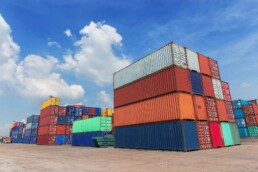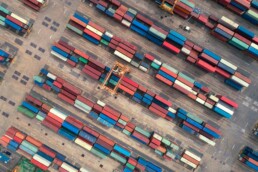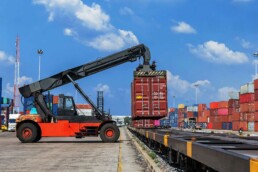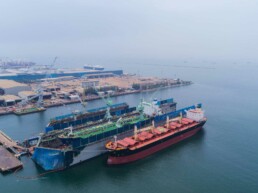Navigating Import Growth Amid Red Sea Delays: Retailer Strategies
In global commerce, the delicate balance between geopolitical events and supply chain dynamics often dictates the trajectory of trade. Despite the challenges posed by Red Sea delays, U.S. retailers express confidence in import growth throughout 2024. However, beneath this optimism lies a keen awareness of rising costs and the imperative for strategic initiatives to navigate the evolving landscape of international trade.
The recently unveiled Global Port Tracker report by the National Retail Federation (NRF) and Hackett Associates illuminates the prevailing sentiment among retailers, projecting a substantial 20.4% year-over-year increase in February. This surge in import volumes is a testament to robust demand, showcasing the adaptability of retailers in confronting disruptions along critical shipping routes.
Approximately 12% of U.S.-bound cargo traverses the Suez Canal, a vital conduit for global trade. Recent incidents, including terrorist attacks in the Red Sea, have raised concerns about the reliability of the supply chain. Despite these challenges, industry stakeholders are proactively implementing strategies to minimize the impact on operations.

Mitigation Strategies and Adaptation
Carriers are deploying a pivotal strategy by utilizing surplus capacity to circumvent disruptions. This involves redirecting voyages around the Cape of Good Hope or to alternative ports, demonstrating a commitment to maintaining supply chain continuity amid Red Sea delays.
Furthermore, retailers are advocating for earlier shipments and exploring alternative transportation modes, such as air cargo, for time-sensitive goods. Collaborating closely with overseas suppliers and logistics partners, retailers aim to optimize inventory management and ensure the timely delivery of merchandise despite the challenges posed by Red Sea delays.
Navigating Cost Concerns

While import growth remains promising, concerns loom over the escalating costs associated with supply chain disruptions. Retailers are bracing for potential price increases and surcharges, especially as they enter into new contract negotiations with carriers. The uncertainty surrounding the duration of the Red Sea crisis compounds these concerns, prompting calls for government intervention to address systemic challenges.
In testimony before regulatory bodies, industry representatives emphasize the need for transparency and accountability in pricing mechanisms. Sarah Gilmore, Director of Supply Chain Policy at the Retail Industry Leaders Association (RILA), underscores the correlation between surcharges and tangible costs, advocating for a balanced approach to pricing adjustments amid Red Sea delays.
Strategies for Building Resilient Supply Chains

As retailers navigate the complexities of global trade amid Red Sea delays, a proactive approach to supply chain management is paramount. Incorporating the keyphrase “Import Growth Red Sea Delays” into the narrative, businesses can enhance visibility and agility within their operations, fostering resilience and adaptability in the face of disruptions.
- Supply Chain Optimization: Implementing robust inventory management systems and demand forecasting tools is crucial for optimizing resource allocation amid Red Sea delays.
- Risk Mitigation: Diversifying sourcing strategies and establishing contingency plans can help mitigate the impact of geopolitical events and natural disasters, including Red Sea delays.
- Collaborative Partnerships: Strengthening collaboration with logistics providers and industry stakeholders becomes even more crucial during times of disruption, contributing to the overall resilience of supply chains amid Red Sea delays.
Beginner’s Guide to Third-Party Logistics (3PL)
The world of e-commerce is always changing, therefore understanding the roll of Third-Party Logistics is integral to keeping up. In light of this our beginner’s guide to third-party logistics (3PL) will delve into the essential aspects, offering insights into fulfillment services, warehousing, and much more.
Read More…
While challenges persist in the form of Red Sea delays and geopolitical uncertainties, retailers remain steadfast in their pursuit of import growth and operational excellence. By embracing innovation and strategic partnerships, businesses can navigate turbulent waters and emerge stronger in an ever-evolving global marketplace. As the industry continues to evolve, proactive adaptation and a commitment to supply chain resilience, especially amid Red Sea delays, will be instrumental in shaping the future of international trade.
Falcon Fulfillment can help tailor solutions to help companies navigate the Red Sea shipping delays. Ensuring a reliable path for import growth despite disruptions.
Let’s Talk!





